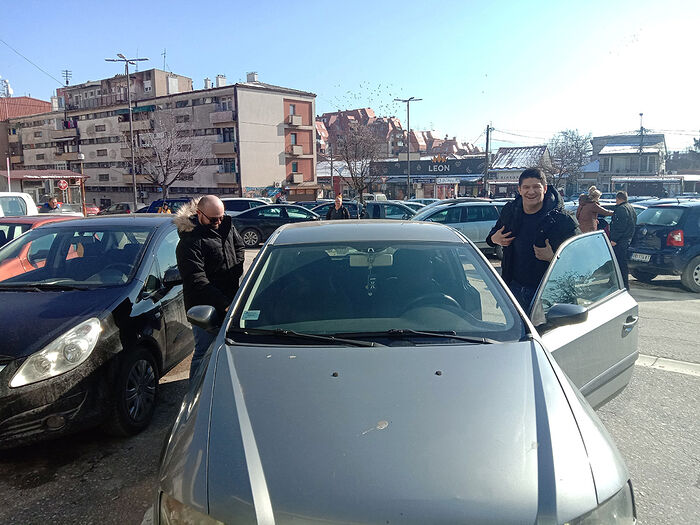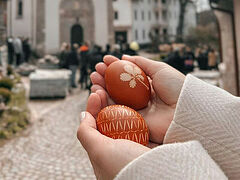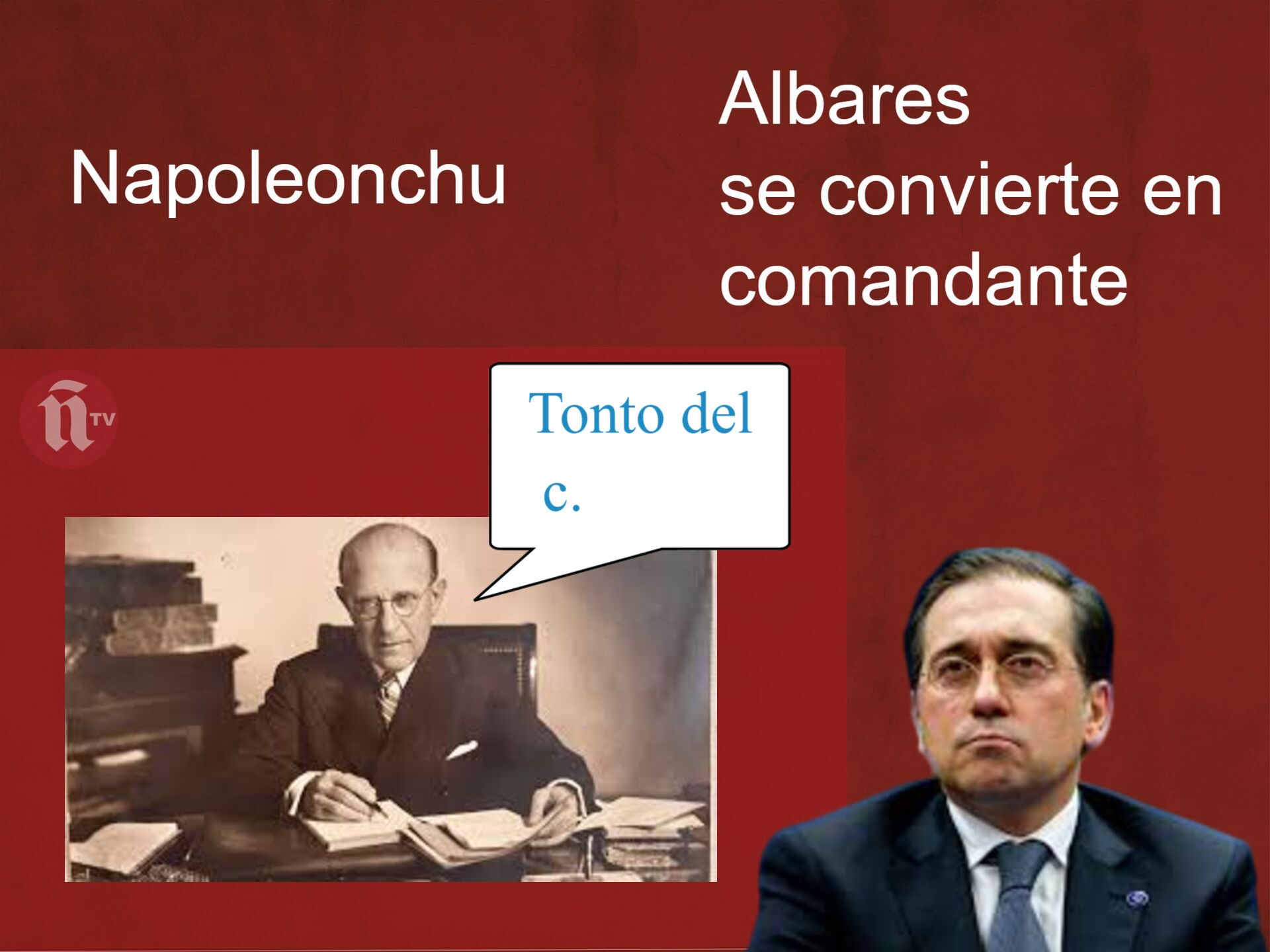If I forget thee, O Kosovo my Jerusalem, let my right hand be forgotten. Let my tongue cleave to my throat if I forget thee, O my Metohija, if I do not have thee as the opening of my song.
—Bishop Atanasije (Jevtic)
 Vranje. St. Nicholas Monastery.
Vranje. St. Nicholas Monastery.
Babylonian captivity is a recurring phenomenon, not a singular event. This can be seen in the example of Kosovo and Metohija. Serbs no longer feel that their own land belongs to them, and visits to Kosovo have become practically impossible for Russians. Much has been said about the reasons for captivity and the humiliation of peoples—both in the ancient Jewish days and in modern-day Serbia. Prophets, holy hierarchs, venerable fathers, and martyrs have even shouted about this: Our troubles are the direct consequences of our own sins and forgetfulness of God. The antidote has not changed a bit; it has remained relevant since ancient times: change your life, become a real Christian, put Christ first in your life—and all other things will fall into their proper place. To put it simply, active repentance is required. Easier said than done…
The Serbs have an answer: while realizing your unworthiness, help your neighbor, work conscientiously, and pray. “The remedy is old but effective. It does not spoil and is proven by centuries,” say my conversation partners, Nikola Vasic and Stefan Mirkovic, staff workers of the Kosovsko Pomoravlje charitable organization, who specially arrived in the border city of Vranje in the south of the country. Now our “Kosovo talks” take place either here or in nearby monasteries. I handed over aid from our readers to them, and they shared the latest news.
The happiest news was shared by Nikola, who was stuttering with excitement: Maria Vasic, his wife, has given birth to a baby girl named Nadezda, who is truly a bundle of joy.
“Imagine—I’ve become a father! I felt both scared and happy. At first I was afraid to take the baby into my arms, but now it’s fine, and I’ve gotten used to it. Maria feels well, now everyone is at home. As you see, the girl’s name was chosen purposely—Nadezda means ‘hope’. We really need to place our hopes on Christ.”
Vologda felt boots, a gift to a young Serbian woman from the skilled shoemaker Nikolai Alfeyevich Saikin, who is concerned about our sister nation, brought delight. "Rest assured that now we are not afraid of any cold," he said. However, there was also some bad news. At the beginning of January, just before the Nativity, the barn and livestock fodder of Aleksandar Jevtic from Kosovska-Kamenitsa was burned. Nikola said, "It was a great blow to him. A thirty-year-old peasant, he has lived for years solely by sheep farming. With a heavy heart and embarrassment, he turned to our organization and to everyone who can help with a request to assist him with repairs. Restoration costs, according to our estimates, will be around 3,000 euros, and it will be a great support for Aleksandar. I repeat: the peasant lives by sheep breeding; farming is his main occupation. In our opinion, this occupation is a very worthy one. The guy does not wear out the seat of his pants in coffee shops to chat over rakia but works hard from morning to evening. So we really want to help him and call on our friends to do the same. God willing, it will work."
I wondered whether the Serbs could move around their native land and whether there were any obstacles put up by their "dear Albanian neighbors" and their American bosses. "Actually," they answered after thinking, "you can drive relatively easily, observing safety precautions. After all, you see, this is Kosovo, and you can't go wherever you want. You won't be received with outstretched arms everywhere. Recently we visited Serbs in the south of the region, in Metohija. Would you like us to tell you this story?" Of course, I did. This is what they told us
 Stefan Mirkovic and Nikola Vasic
Stefan Mirkovic and Nikola Vasic
.
Serbian "downshifting"
Not far from the village of Istog live most of the Serbs who returned to Kosovo and Metohija. During the war in 1999 and the unrest of 2004, people left their homes. Some left with the army, others fled later, when the tyranny of the new authorities began. Now they are slowly returning, despite the difficulties. To return to your home in an occupied region requires superhuman will, strength, and courage. But, as these people say, it's worth it: they feel that their youth is returning, and that life, after so many years of wandering, has a purpose again.
As you drive, you look around and see ruined empty houses, walls riddled with bullets and shrapnel, and neglected fields -- such a "greeting" from the recent past. You understand that you have come to a place where the war has never ended thus far. Chaotically overgrown bushes cover the empty windows in the once rich village of Zac... It's probably like finding yourself in the Old Testament when the first captives released by the Babylonian king had just come to the destroyed Jerusalem.
We arrived in Istog early in the morning and were very tired. We felt like a cup of coffee and just relaxing. But Petko Miletic was already waiting for us. He waved his hands, shouting, "Come here, I've prepared everything!" We drove along the bad road up to his house. Petko is raising his daughter Tamara and son Lazar alone. Both of them go to school. What do they do for a living? They cultivate land and breed livestock and poultry. How else can you stay afloat in this area? There are no jobs for Serbs. But they hold on and do it seriously; they work conscientiously.
They sell their produce at the market in Kosovska-Mitrovica when they can travel there safely. It's almost 95 miles away, so it's 190 miles there and back. But they hold firmly to their native land—their grandparents and great-grandparents lived here, and according to Petko, "there's nothing to do in a foreign land where you're like a tree without its roots." Incidentally, he was born in Belgrade, and the house and land in Metohija belonged to his grandmother.
"But, you see, I couldn't sleep when I lived in the capital with its hustle and bustle, realizing that my real homeland was in Kosovo and Metohija. Here we are at home. As for Belgrade, it's so-so. I can't be a resident of the capital--I want to live in my native village." Such is the Serbian "downshifting."
Of course, for his children, everything is new and interesting here. It's good that their father is a handyman and works hard—he tends the household so that they don't starve and don't complain.
"I will stay here anyway. I want my children to truly love their native land and to be the masters here. I do all in my power to ensure that they have everything they need both at home and at school. When they grow up, they will decide for themselves whether to stay here or not."
Tamara is going to study psychology at the University of Pristina (now in Kosovska-Mitrovica), while Lazar concentrates more on programming. They don't long for life in the capital; there is hustle and bustle there, while it is beautiful here. And their peers from Belgrade are jealous; they respect such a serious and selfless choice.
We are heading to Osojane, a village that was burned to the ground during the war, and all the Serbs were expelled. However, the Serbs are a stubborn nation, and two years later, they returned and began to restore houses and farms. Everyone looked at them as if they were crazy—they slept in barns and worked during the day, persistently building walls, roofing houses, glazing windows, and painting. The monks from surviving monasteries and the bishops considered this return a miracle. Now, there is a secondary school in Osojane with forty students, two more branches in other villages, and a school named after St. Sava of Serbia, thank God, with a sufficient number of students from this area.
Right in Osojane, there is St. Nicholas Church, which was first mined and then destroyed during the war. After the Serbs' return, the church was restored, and now services are celebrated in it. The rector, Fr. Dalibor Koic, welcomed us cordially. In the church's courtyard, there is a monument to all the fallen and missing residents of the Istog community. The list of names is long, and alas, still incomplete.

A village of heroes is located in this region that, like a real hero, overcame all attacks and attempts to expel the Serbs. It is called Crkolez and lies in the lowlands near the Mokra Gora Mountain. There has been a joke about Crkolez since the war: a KFOR (the Kosovo Force) soldier asks an Albanian what kind of people live in Crkolez. They are being attacked from all sides, but they are defending themselves, as if there were a whole Serbian division in the village, and not a handful of locals. The Albanian replies: "I have lived here all my life and know these Serbs well. If they were sane, they would have fled long ago." Such are the "insane" Serbs. This naturally makes us glad. The self-irony of locals, their willingness to defend their churches, their honesty, and knightly dignity—they will never take anything that doesn't belong to them. That is why the Albanians both respect them and are somewhat afraid of them, we must admit.
Working on their native land quietly and conscientiously and breeding livestock, the villagers have never thought of selling a single meter of their land. "If there was no land, there would be no us," they say. "Our business is to work and not lose heart." There is also a school with eleven children there, and a dispensary in the school building. "We don’t need much--we have everything we need, and there’s nothing to complain about." They speak calmly, look straight ahead, and live soundly.
The village Church of St. John the Baptist was built back in the fourteenth century. In 1355, it was set up by Voivode Radoslav, who was tonsured with the name Jovan. The church became the metochion of the Athonite St. Panteleimon’s Monastery. Tradition has it that at the entrance to the church, a sapling of a tree from the Patriarchate of Pec Monastery, one of the major shrines of Kosovo and Metohija, has been growing for centuries. "Our church keeps us as long as we keep it," a boy near the church said. We noticed that here, in Crkolez, most residents are young, and this inspires hope.
Love and consent in response to thefts and robbery
The last village in the south of the region, where we arrived that day, is called Ljubozda. Thirteen families returned here in 2017, and they convince us by their example that nothing can ever be achieved without love and consent.
As is the case with the vast majority of Kosovar Serbs, the villagers' occupation is farming. According to them, the main trouble is thefts and the destruction of property. Sometimes they are away for a short while (for work matters or to go to a doctor), and they always keep in mind that their "dear neighbors" can steal or spoil something. For instance, they like stealing equipment.
“Well, we are already used to it and have become more cautious. If you have nothing but your hands, they have nothing to steal,” one local man jokes. His jokes are sad, but he smiles.
The people of Ljubozda know what mutual help is, and they appreciate it. They will always support each other, so no one seems to be discouraged.

There are some people who have returned to their homes. Every evening, the whole village meets at someone's house--there is always a reason for a good meeting. True, they remember the olden times and trials, but they aren’t hung up on them. They talk more about how to properly develop the village, what needs to be done, say, tomorrow or this week so that such-and-such a street can look better. In addition to the households, they have renovated and cleaned several churches and cemeteries and started collecting local folklore, legends, and stories--both new and old.
One of the oldest churches in Serbia is here, along with an ancient cemetery, which is carefully looked after by locals. The medieval Monastery of the Mother of God of Hvosno (Hvostanska) is known as Khvostanska Studenica, or Mala (Small) Studenica--only its foundations have remained. There also used to be a sixth-century basilica. When the Serbian Church became autocephalous in 1219, the monastery was the residence of seven Primates of the Church. But, of course, there is also an active church in Ljubozda--spiritual life does not only consists of sad ruins.
Metohija is monastic soil, a land of holy monasteries. Because it belongs to holiness, both the land itself and the people inhabiting it have suffered and continue to suffer. It is not easy to be a Serb and Orthodox in your native land--the price for your faithfulness to Christ and the Fatherland is often very high, sometimes even life itself. But, as our those with whom we spoke during the last trip around the region say, “How can we renounce the truth?” There is only one truth here, although it is not engraved in golden letters on monuments or in epitaphs: “Without Christ you can do nothing.” With God alone the Serbs can overcome all troubles and sorrows.
Nikola hurried to his family. Stefan and I looked at each other knowingly—a father's duty! We agreed to meet again, God willing. The guys rushed off to Kosovo and Metohija--the border is very close. As I walked around the city I recalled their words: "Without God, without repentance, without labor we will not achieve anything." I completely agree with them.












